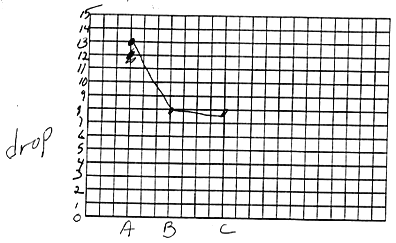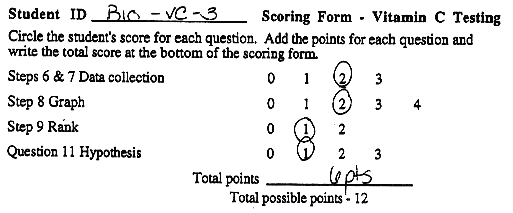|
Contributed by: New York State Alternative Assessment in Science
Project (NYSED)
Task: At this station, you will experiment to determine
the amount of Vitamin C contained in three unknown beverages.
Materials:
- 3- 5 oz. Plastic cups labeled Test A, Test B, Test C
- 3- 5 oz plastic cups labeled Control A, Control B, Control C
- 3 beverages marked A, B, C
- 6 stirrers
- 3 eyedroppers (disposable)
- 10 ml graduated cylinder
- idophenol solution (60 ml dropper bottle)
- paper towels
- safety goggles
- water
Directions:
- SAFETY GOGGLES MUST BE WORN WHILE COMPLETING THIS TASK.
- DO NOT TASTE ANY SUBSTANCE USED IN THIS TASK.
- Put on safety goggles.
- Place 10 ml. Idophenol solution in test cup A.
- Place 10 ml. Water in cup Control A.
- Add one drop of test beverage A to each cup and stir well.
- Keep adding beverage, drop by drop, until the contents of both
cups look the same color. Stir after each drop.
- On the data table record the number of beverage drops it takes
to make the test cup liquid look like the control.
- Repeat the steps above for beverages B and C.

- Construct a bar graph of the results on the graph sheet on the
next page.
- After testing all beverages and graphing the results, rank the
beverages in Vitamin C content: most = 1, second most = 2, etc.
and record on the chart on this page.
NOTE: The fewer the drops of beverage needed,
the greater the vitamin C content of the beverage!

- Based on your results, which of the drinks, solutions A, B,
or C contains the greatest amount of Vitamin C?

- Sodium bicarbonate (baking soda) is added to vegetables like
broccoli, asparagus, and spinach in some restaurants to preserve
their green color while cooking. Some people are concerned that
sodium bicarbonate might break down or reduce the Vitamin C content
of these foods. Using complete sentences describe a hypothesis
that could be used in an experiment to test this concern.

Scoring
Circle the student's score for each question. Add the
points for each question and write the total score at the bottom of
the scoring form.

|






